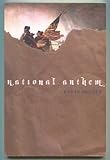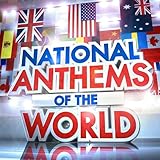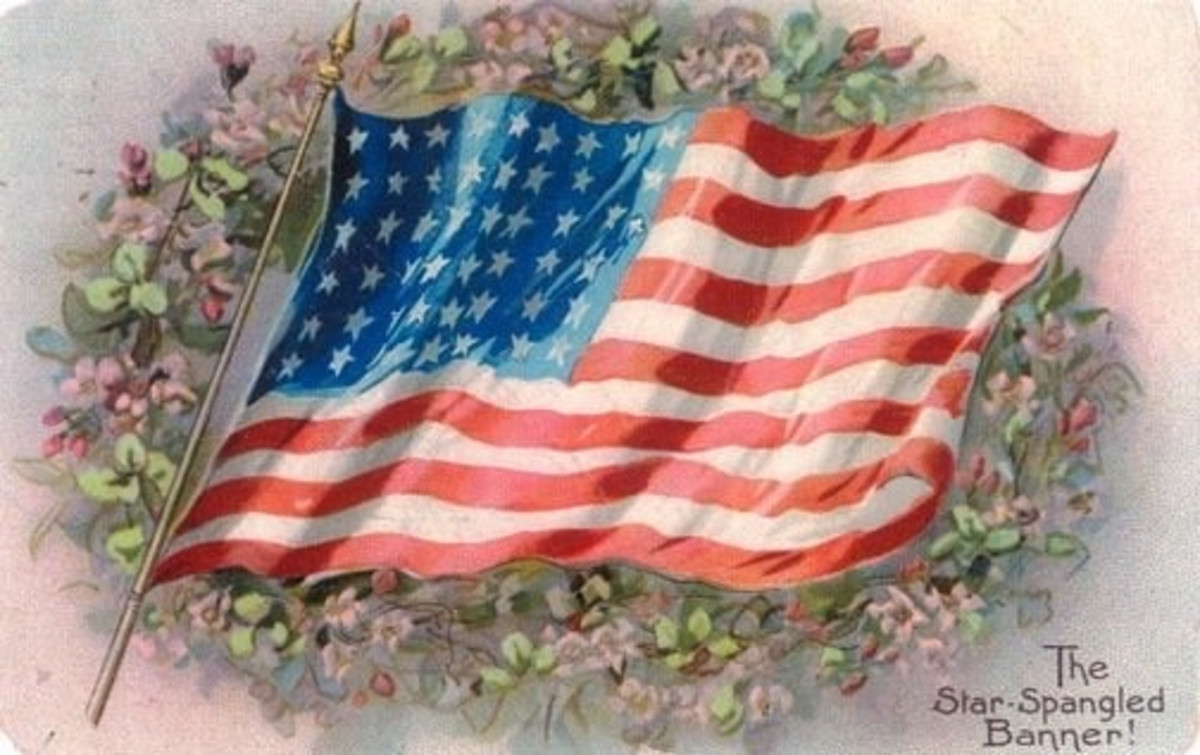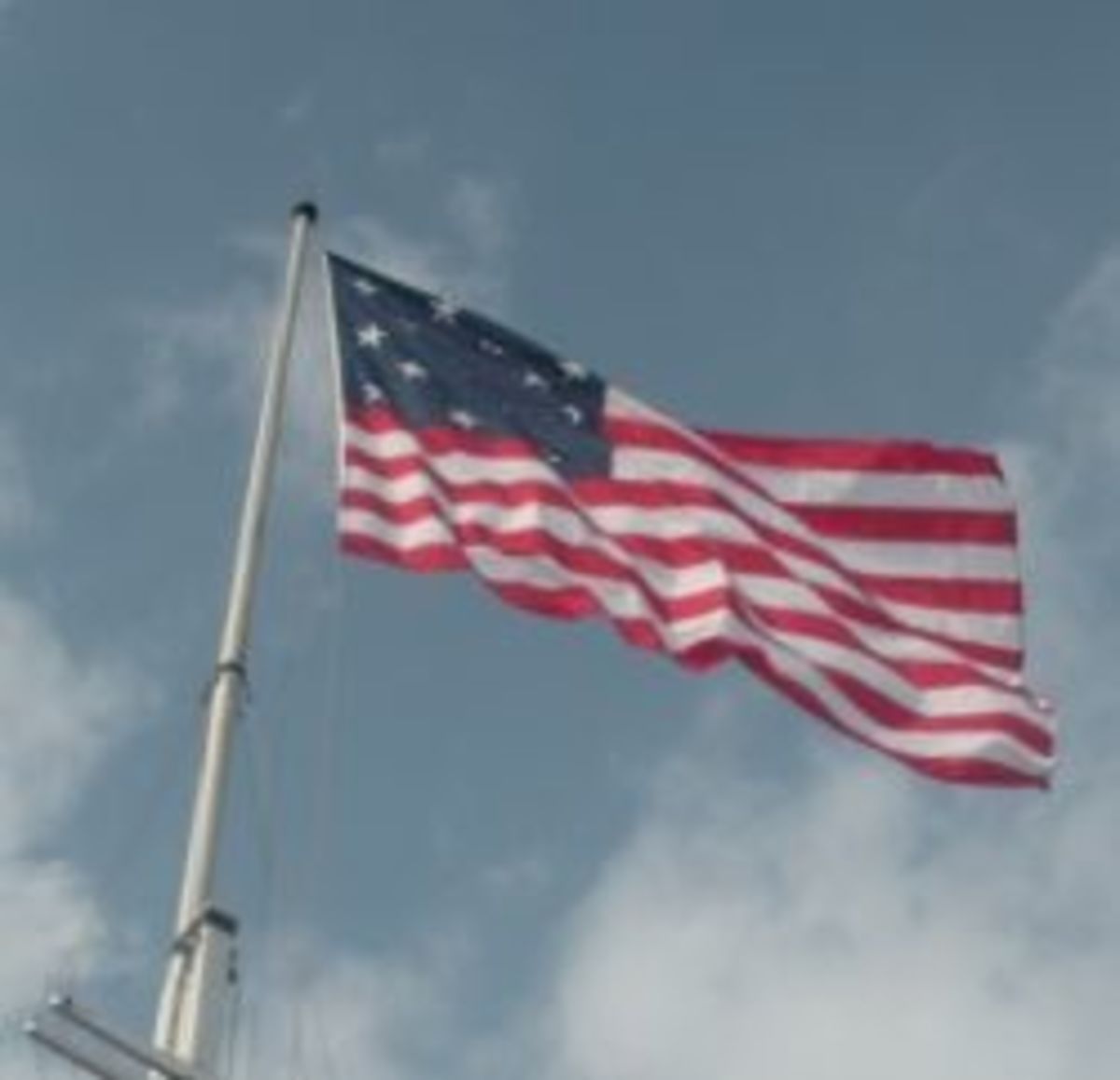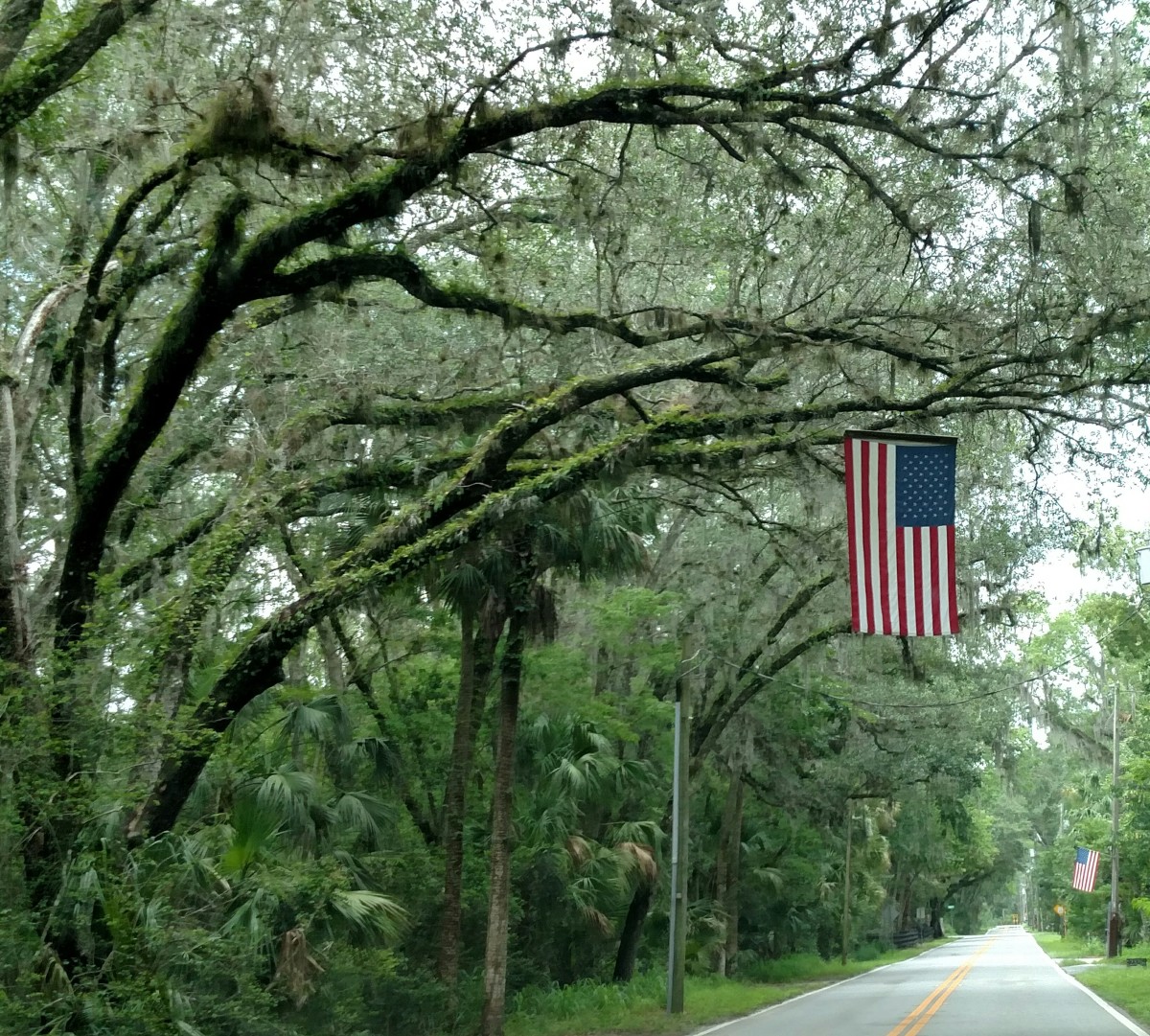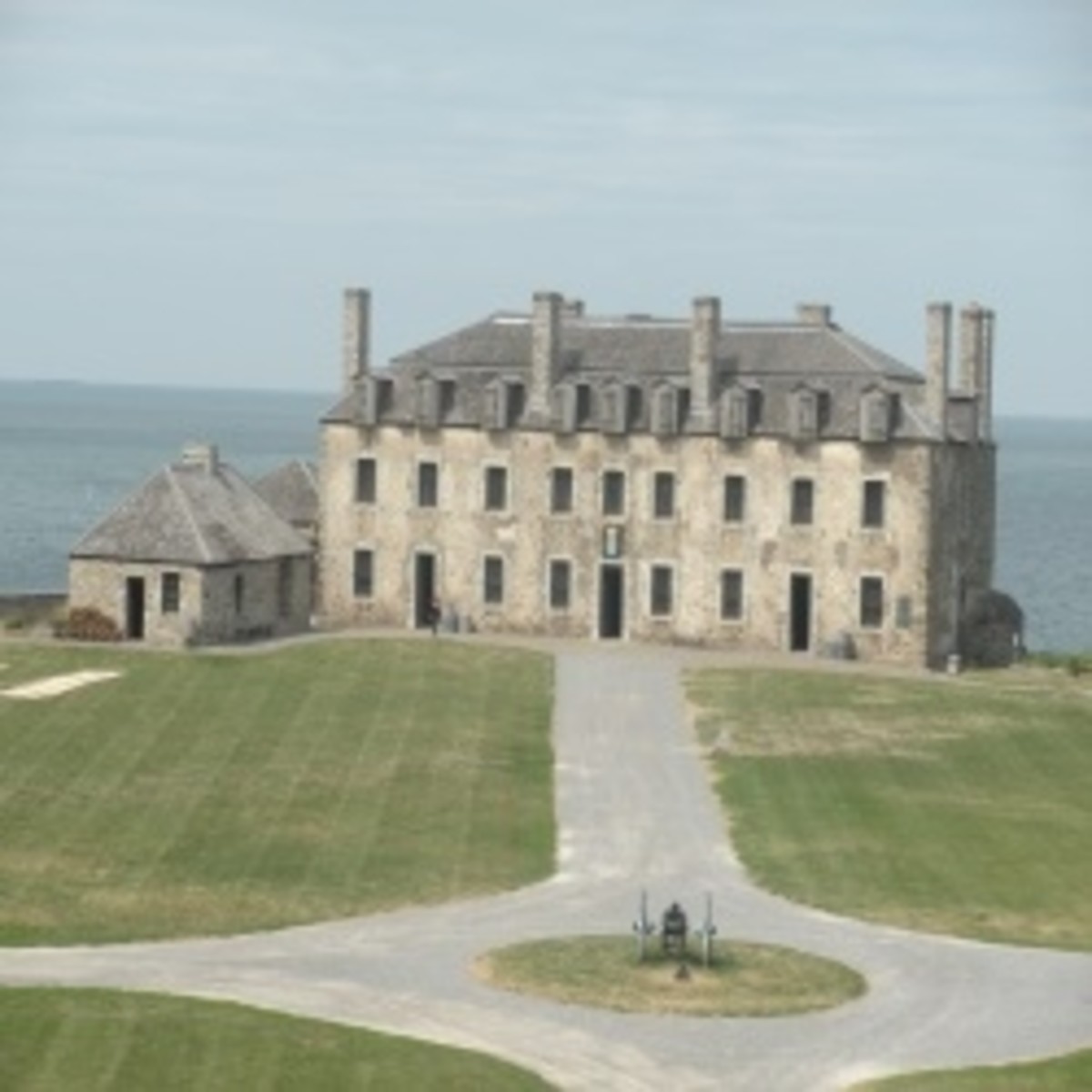National Anthems
Do you know your country's national anthem? Really? Can you sing it? Can you hum it? Do you know all the words? Even the ones that don't appear in the first verse? Do you know who composed the music and who wrote the lyrics? Most people don't. Even if you do know your own country's national anthem really well, chances are you don't have a very clear idea of how it compares to other national anthems.
A national anthem is like a hymn in praise of your country. If you are ever asked to represent your country at an international event, chances are the national anthem will be played. A country's national anthem says a lot about it.
In this hub, we will listen to and discuss many different national anthems.
One Verse Version of the Star Spangled Banner
Inspiration for "The Star Spangled Banner"
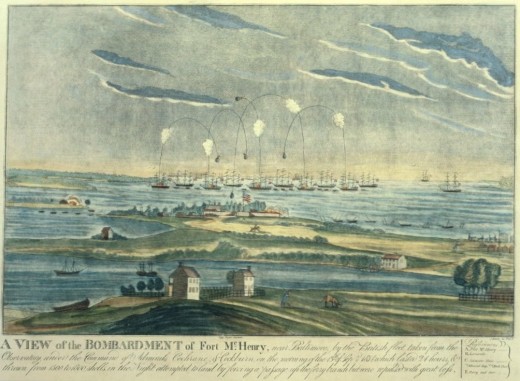
Anacreon in Heaven
Anacreon in Heaven was composed by John Stafford Smith and written by Ralph Tomlinson. It was the official song of the Anacroeontic Society, a club for amateur musicians in London, and every verse ended with this refrain: "And long may the sons of Anacreon intwine the myrtle of Venus with Bacchus' vine." It was a bawdy drinking song, and everyone in America knew it.
Anacreon in Heaven
The Origin of "The Star Spangled Banner"
The Star Spangled Banner came into being during The War of 1812, which lasted from 1812 to 1815 and involved some crushing and humiliating losses for the United States. At one point, Washington D.C. was sacked and burned, and if it were not for the help of pirates at the Battle of New Orleans, the war could well have ended in a British victory. But everything turned out all right in the end, and there was an upsurge of patriotism, culminating in the adoption of The Star Spangled Banner as the national anthem of the United States.
Francis Scott Key came up to a British man-of-war off the coast of Baltimore bearing a white flag in order to arrange for the surrender of a prisoner who was held on board. The negotiations for the release of the prisoner went well, but while Key was on board, the ship carried out a night bombardment of Fort McHenry. Key found himself viewing the scene from the enemy's vantage point, and the sight of the American flag still waving during and after the bombardment left a strong impression on his mind. When he returned from his mission to secure the release of his friend, he wrote The Star Spangled Banner.
Of course, when I say he wrote The Star Spangled Banner, I mean that he wrote the words. He did not compose the music. That music already existed, and it was part of a song called Anacreon in Heaven. In other words, the United States National Anthem is a filk.
The Original Text of "The Star Spangled Banner"
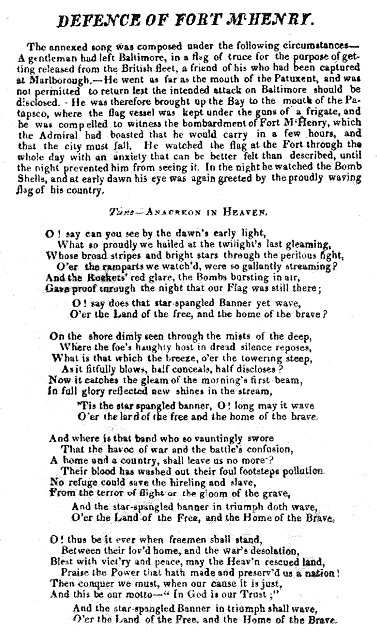
How Many Verses does "The Star Spangled Banner" consist of?
Most people only sing the first verse. Religious people, in church gatherings, tend to sing the first and the last verse, because Key didn't mention God until verse number four. When I became an American citizen, I was given a copy of a booklet that included the Declaration of Independence, the Constitution and a three verse version of The Star Spangled Banner. I've seldom heard anyone sing all three of those verses, but I was surprised, when researching this hub, that there was another fourth middle verse written by Key that was not adopted by the government as part of the National Anthem:
Oh where is that band that so vauntingly swore
That the havoc of war and the battle's confusion
A home and a country shall leave us no more?
Their blood has washed out their foul footsteps' pollution.
No refuge could save the hireling and slave
From the terror of flight or the gloom of the grave.
And the Star Spangled Banner in triumph doth wave
O'er the land of the free and the home of the brave.
Why was this verse left out of the official version? Possibly because it's a little too angry and vengeful. A national anthem represents a country to the world. Perhaps it was decided this verse does not leave the right impression.
The remaining three verses of the American national anthem speak of patriotism, national pride, strength under pressure, but not the desire to abase or destroy anyone else.
Two Verse of the Star Spangled Banner
Two Verses of the Star Spangled Banner
The Things A National Anthem Should Not Say
I like The Star Spangled Banner for what it says, but I appreciate it even more for what it does not say. A national anthem should serve as a focus for citizens to share their patriotism, accentuating what they all share, and ignoring their differences. A national anthem also represents a country to its neighbors, and it should give the impression of strength and resolution, but it should not give offense to outsiders. The Star Spangled Banner does all this. It says we are strong, we are brave, we will persevere. And it stops there.
Here is a list of things that a national anthem should not say:
From a domestic perspective, a national anthem should never say:
- this country is only for people of a certain ethnicity
- this country is only for people who belong to a certain social class
- this country is only for people who believe in a specific religion
From an international perspective, a national anthem should not say:
- we are better than you are
- we are purer than you are
- we want to irrigate our fields with your blood
Who would say such a thing? Well, have you ever listened closely to the words of the Marseillaise?
The Marseillaise
An artist's depiction of the first time the Marseillaise was sung
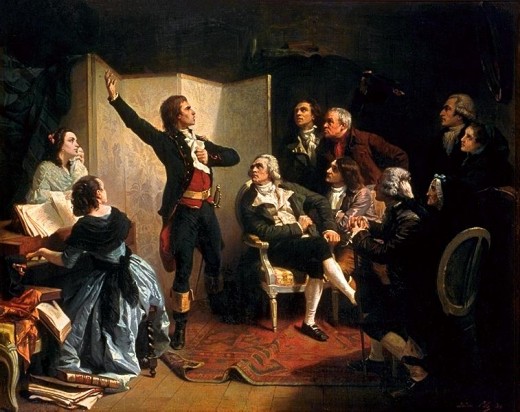
Manuscript of La Marseillaise
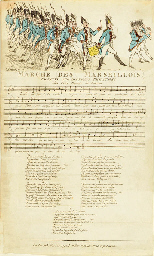
The Paris Commune of 1871
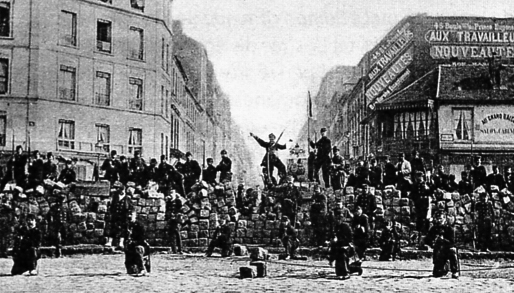
Sheet Music for La Marseillaise
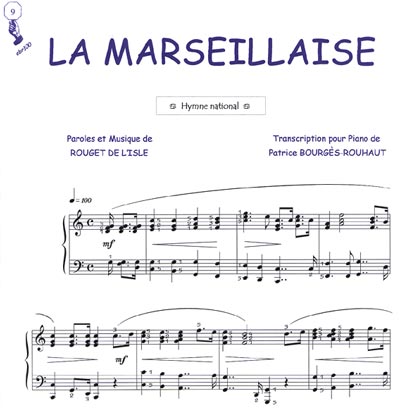
La Marseillaise: The French National Anthem
According to Paul Nettl, author of National Anthems: "The Marseillaise is next to God Save the King the most generally known of all national anthems. If the British Anthem came to be in a sense the international prayer for the monarch, the French anthem came to be similarly the international song of revolt." (Nettl 1952.68). But did you know that the composer, Claude Joseph Rouget de L'Isle, was not a revolutionary, but a loyal subject of the king and a supporter of the Bourbons?
The year was 1792. Holy Roman Emperor Francis II and Prussian King Frederick William II had signed a treaty whose purpose was to contain the territorial expansion of France which was then rife with revolutionary ideas that endangered all the crowned heads of Europe with anti-monarchical propaganda. The pact was signed at Pillnitz, near Dresden. As a reaction, France declared war on these Germanic superpowers on April 24, 1792.
Rouget de L'Isle was at the time a captain in the Corps of Engineers stationed in Strasbourg. He was not only a good soldier. He also happened to be a talented poet, singer, violinist and composer, and he was by no means shy about sharing his talents. He always got his turn at the local filksing. When the news of the treaty and the declaration of war spread to Strasbourg, Rouget de L'Isle, overcome with patriotic fervor and the love of France, wrote a song which he called Chant de Guerre pour L'Armee du Rhin. (Battle Song for the Rhine Army.) The song referred obliquely to the Prussian King and the Holy Roman Emperor as tyrants who were out to attack France, and it suggested that it would be a good idea to spill lots of enemy blood and to irrigate the fields with it.
The Battle Song that Rouget de L'Isle introduced to his friends at the home of the mayor of Strasbourg had a really catchy tune, and it was immediately a great success. Everybody at the party liked it, and they all went home singing it. The song spread by word of mouth and in no time at all it was also published.
According to Nettl, "a lady friend of the house had produced a very amateurish piano accompaniment, for the poet and composer had noted down only the melody and a brief postlude for the violin. The song was published with the imprint of the firm of Th. J. Dannback of Strasbourg and a dedication to Marshal Lukner, Commander-in-Chief of the Army of the Rhine." (Nettl 1952.69)
Music is a very powerful weapon, and like all weapons, it is a double edged sword. It can fall into the wrong hands, and it can be used against its makers. The song spread like wildfire. People were singing it in Paris. People were singing it in Marseilles. Nobody cared what it was about exactly, but it was definitely a rousing song to kill people by.
Written on the night of April 24th and shared with friends the following day, by July 3rd of the same year The War Song of the Rhine Army was already a folk song known to all. Nobody remembered who had written it or what it was about, but they all enjoyed singing it, and it spurred them on to rise against tyrants and irrigate the fields with blood. A group of volunteers from Marseille who had come to help move the revolution along in Paris sang it as they were storming the Tuileries on August 10. From that day forward, the song became associated with Marseilles, and it was renamed the "Marseillaise." It became the National Anthem of France on July 15, 1795, and henceforth it was sung at all official functions, including every execution -- of which there were many.
I quote from Nettl: "When Rouget de L'Isle was confronted with the question of whether he was willing to submit to the decisions of the National Assembly, his answer was a manly 'No!' That was enough to make him lose honor and rank and to be put in prison. If Robespierre had not beaten him to it, the creator of the Marseillaise would have lost his head on the guillotine to the strains of his own music." (Nettl 1952.70.)"
Does it pay well to write your country's national anthem? Not really. For years after being released from prison, Rouget de L'Isle lived in abject poverty. He tried to eke out a living by taking on odd jobs as a translator, newspaper correspondent and music copyist, but he did not always have enough money to pay for his dinner, and he had to skip meals. Eventually, when he was old, people remembered that he had written the national anthem, and Louis Philippe granted him a pension of fifteen hundred francs, which was not much, but kept him from starving.
Today, if you mention to someone that The Marseillaise is a song about spilling enemy blood, they will tell you that no one who hears it imagines it is about going to war with neighboring countries. To most people, it a song about Frenchmen killing other Frenchmen, so they are not offended when they hear it sung at international functions. They do not believe it is directed at them. To many, it is a song about class warfare, and they believe that people the world over should unite against the rich for the sake of the poor. This song was sung by Russian Bolsheviks before they wrote their own songs. It is seen as a paean to egalitarianism and as a song of revolt against authority. Everybody knows that it's not about killing foreigners for the sake of France's territorial expansion. Everybody has always known that -- except for the man who wrote the song, and his small circle of friends!
The British National Anthem: God Save the Queen
The British National Anthem: God Save the _____(fill in the blank)
In contrast to The Marseillaise, the British National Anthem sounds more like a lullaby than a battle hymn. It represents the British national character rather well, and the words, while a little bit insipid in the first verse in which good things are wished for the monarch of the moment, get downright amusing in the verse that asks the deity for intervention in the domestic affairs of other nations:
O Lord, our God, arise,
Scatter her enemies,
And make them fall.
Confound their politics,
Frustrate their knavish tricks,
On Thee our hopes we fix,
God save us all.
The most original line, in its ingenuity, I think is: "confound their politics." While many nations pray for their deity to give them triumph in battle over others, it is an unusual request to ask also that the enemy should elect the wrong leaders and fail in managing their own affairs. No wonder the French think the British have no emotions, and the Americans in their own anthem refer to the British as "haughty."
There is no agreed upon attribution for the British National Anthem, but it was well established by 1745. In the United States, the same tune is used for the song "Our Country 'Tis of Thee", which adopts the same peaceful melody to laud America as a land of liberty, while reserving the title of "King" to God, in the obligatory religious verse.
Haydn Portrait
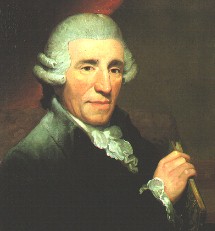
The German National Anthem: Deutschlandlied
What country doesn't want to conquer the world? Come on, let's be honest! It's a natural drive. Dreams of empire and territorial expansion come to many, and in the hour of its glory, every great nation gets that chance.
The current lyrics of the German national anthem are very tame and speak only of the things that national anthems tend to speak of: an appreciation of one's country and its people and culture. However, for those who were witnesses to the events of World War II, the words "Deutschland, Deutschland uber alles" resonate with an ominous other meaning. Germany over everybody else -- crushing the world under its feet.
However, like most anthems, this one has a long and convoluted history as well. The music to the German national anthem was composed by Joseph Haydn, but originally it was to a different set of words.
Gott erhalte Franz den Kaiser,
Unsern guten Kaiser Franz,
Lange lebe Franz der Kaiser,
In des Gluckes hell stem Glanz.
Ihm erbluhen Lorbeereiser,
Wo er geht zum ehren Kranz.
Gott erhalte Franz den Kaiser,
Unsern guten Kaiser Franz.
Translated, it goes something like this: "God keep Franz the Emperor safe, our good Emperor Franz, Long live the emperor in the glow of happiness. Let laurel leaves blossom wherever he goes to make him a glorious crown. God keep Franz the emperor safe, our good emperor Franz."
The words, by Lorenz Leopold Haschka, were about as profound as those of "For He's a Jolly Good Fellow", but the music was sweet, and it was all vaguely reminiscent of the British national anthem. This was no coincidence, as Haydn had been to England, and he came home with the project of somehow coming up with a similar national anthem for Austria, something to counteract the Marseillaise.
For this good Emperor Franz was none other than Francis II whom we met earlier in this hub, when he made a pact with the King of Prussia to keep France at bay, thereby causing Rouget de L'Isle to inadvertently compose the song everyone would be singing at the storming of the Tuileries and at every official execution thereafter! And now the good emperor Franz was in a bit of a pickle, because he didn't want what had happened in France to happen to him.
Kaiserlied

Emperor Francis II
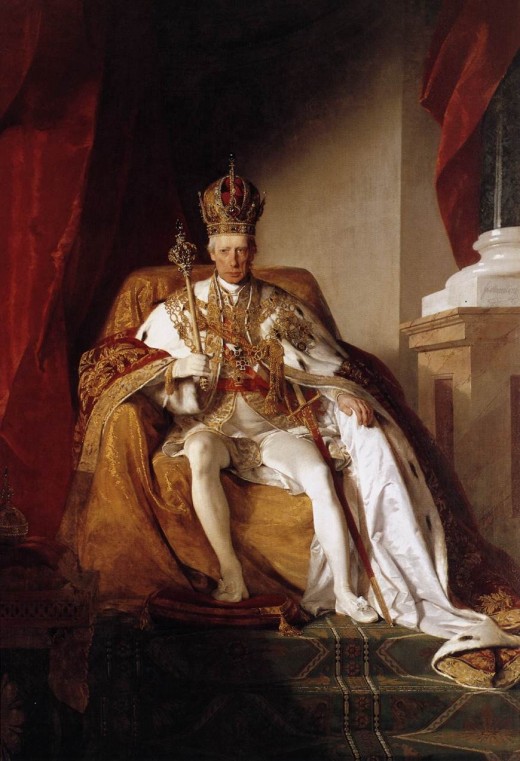
The Holy Roman Empire under Hapsburgs
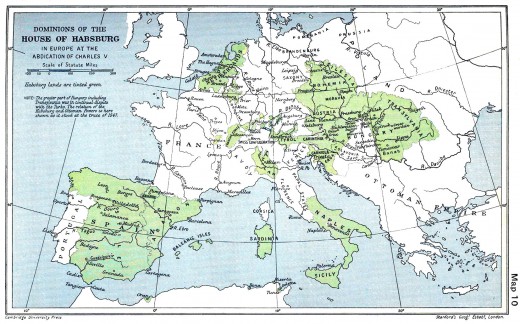
Das Lied der Deutschen: The Song of the Germans
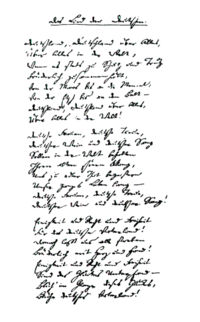
The Dissolution of the Holy Roman Empire and the Emergence of German Nationalism
Who was this Kaiser Franz, so beloved of his people, and what was his nationality? Who were his subjects and what was he Emperor of? His mother was Maria Luisa, the daughter of the King of Spain. His father was Grand Duke of Tuscany at the time of his birth, and he was born and raised in Florence, but he was an heir to the Hapsburg Crown. He was a Holy Roman Emperor, but his empire was arguably not holy, and certainly not Roman. It was a multi-ethnic empire, where Italians, and Germans, Czechs and Austrians and Hungarians all answered to the same emperor, even if they lived in non-contiguous regions and spoke mutually unintelligible languages.
When that empire finally crumbled something new and fresh emerged, something newer and better than democracy or republicanism with their confounded politics and knavish tricks: this was the birth of nationalism. It is no coincidence that the discovery of nationalism and the invention of the national anthem occurred at one and the same time.
"Gott erhalte Franz den Kaiser" is not a national anthem: it is a celebration of love for a particular person, somebody named Franz. As soon as they had a new Kaiser, one whose name did not rhyme with the word "Glanz", they would have had to write a completely different song to commemorate their allegiance. But under nationalism, the love that people celebrate is not the love for a single individual, but the ardor that they feel for their nation.
Can you imagine Francis Scott Key, writing "God protect President Madison"? Even Rouget de L'Isle, who was a staunch royalist, wrote not of his love for the King, but of "Amour sacré de la Patrie" . His was a nationalist song, and that's one of the reasons it remains France's national anthem to this very day.
Because so many things were changing at the same time in the late 18th century and early nineteenth, when people talk of that period today, they mention the rights of man, and democracy and the rise of free thinking, but they forget how nationalism changed the face of the earth.
When, in 1841, August Heinrich Hoffman von Fallersleben wrote the words "Deutschland, Deutschland uber alles" to go with Haydn's old melody for Kaiser Franz, he was exhorting the various German rulers to give the creation of a united Germany a higher priority than the independence of their small principalities. "Germany above all" was an appeal to nationalism, to overcoming small differences for the sake of what all Germans had in common.
Hoffman von Fallersleben
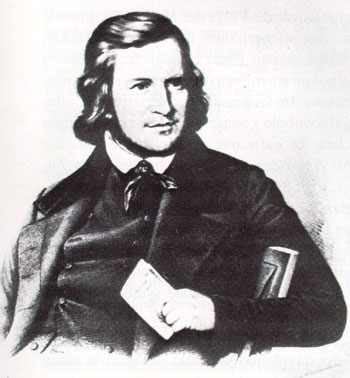
What is nationalism?
Today, many people are convinced that nationalism is a bad thing, and some think it is another word for institutionalized racism. But toward the end of the eighteenth century and during most of the nineteenth century, nationalism was a positive ideal. From the ruins of the Roman conquests and through all the stagnant centuries of the middle ages, new identities were being forged, new languages were coalescing and new cultures were starting to grow.
The nations that these national anthems were being written for had never existed before. Arguably, no nations had existed before in the locations where these nations were arising. There had never been any Germans, or Frenchmen or British or Italians, prior to the formation of their languages and cultures. And there certainly had been no Americans, before the colonization of the new continent. In all of these places there had been tribes: Frankish tribes, Angles and Saxons, Navajo and Sioux. But there had been no geopolitical unit that commanded anyone's loyalty and undying love, the sacred love of country -- until these nations coalesced into being from their fragmented origins.
A nation isn't a group of people who are related to each other by blood. A nation, in the new sense that it was given in the age of national anthems, was not about race or ethnicity. It was about a coherent culture and set of values that brought different people together in a common cause. It was that sense of "nation" to which The Star Spangled Banner referred in the line "that has wrought and preserved us a nation." The British and the majority of the Americans were very closely related. They spoke the same language. They came from the same culture. But their values were so different and their boundaries so remote, that no bond could hold them together.
When Hoffman von Fallersleben wrote the new lyrics to the Haydn melody, based on an earlier poem by Walther von der Vogelweide, this was the kind of nationalism that he meant: that those who lived in the German speaking areas and spoke German and participated in the German culture were all one people, and that their "German-ness" was more important than who their ancestors were or which foreign prince they were supposed to answer to.
"The Song of the Germans" was written by Hoffman on August 26, 1841 on the island of Heligoland, then a British possession. It was adopted as the de facto national anthem of the Second Reich under William the II, but it was not accepted as the official German national anthem until President Hindenburg of the German Republic signed a decree on August 11, 1922.
When the Third Reich decided that belonging to the Aryan race was more important than being a member of the German culture and started exterminating loyal German citizens based on ancestry, it was they who turned their back on the ideals of nationalism.
Eventually, after the WWII was over, nobody could stand to hear the German national anthem anymore, because it reminded them of what had been done under the heading of Deutschland, Deutschland uber alles. For years after being defeated by the allies, the Germans had to do without their national anthem altogether, and even the Haydn melody was held suspect. Today, the national anthem of the reunited Germany consists only of the last verse of Hoffman von Fallersleben lyrics:
Einigkeit und Recht und Freiheit
Für das deutsche Vaterland!
Danach lasst uns alle streben
Brüderlich mit Herz und Hand!
Einigkeit und Recht und Freiheit
Sind des Glückes Unterpfand;
|: Blüh' im Glanze dieses Glückes,
Blühe, deutsches Vaterland! :|
Unity and right and freedom for the German fatherland, toward this let us all strive, brotherly with heart and hand....etc.
Italian National Anthem
Soviet National Anthem
Japanese National Anthem
National Anthem of Iran under the Shah
The National Anthem of the People's Republic of China
National Anthem of Taiwan
The National Anthem of the Qing Dynasty
Conclusion: The National Anthems of the World Reflect the Hopes of Nations
Some people cynically dismiss patriotism as a manipulation on the part of rulers to keep the masses in check. Many despise national anthems because of all the evil things that have been done while the songs were playing. Music is a powerful force, and it can be used to great effect -- and not always for a good cause. But a national anthem, when it is genuine, is a love song for one's country.
I don't blame the composer or the lyricist when such a song is used for perverted ends by evil men. I think it is important to distinguish the anthem from the ruler, and the love of one's country from the the blind submission to authority that some substitute for patriotism.
When I set out to write this hub, I was hoping to be able to write about all the world's national anthems, to compare and contrast them, and to show how each captures some special quality of the nation that it represents. However that task is entirely too much for one person to undertake in a single hub, although I have embedded a few sample anthems from around the world, and I have included links to a few hubs written by others about specific national anthems. If your country's anthem is not included here, and you have written a hub about it, please place a link in the comments box below. In time, with the help of fellow hubbers, we may yet cover the globe with all its different songs and cultures.
As you listen to the different anthems, ask yourself how well each represents its country, and whether any of them violate the basic tenets of nationalism by focusing on a single ethnic group or a single religion, at the expense of all the citizens of that country.
Sometimes the song is good, but the use to which it is put is not. I know I have always enjoyed the former Soviet Union's national anthem, even though I never liked the regime for which it stood. If you have time, watch the video that I have embedded. Ask yourself: what makes this an effective song and an impressive national anthem? Does it represent the Soviet ideals well? Or does it cloak them?
The Israeli national anthem, for instance, while expressing some beautiful sentiments, clearly violates one of the basic rules about what a national anthem should not do. Based on a poem from the diaspora, it expresses the longing of the Jew for a home. But Israel is for the Israelis -- not the Jews. A good anthem for the State of Israel should speak to all Israelis, regardless of ethnicity or religion.
Some songs just cheer me up when I listen to them. The Italian national anthem refers to Scipio Africanus with great adulation. This means, to me at least, that Hannibal has not yet been forgotten on the Italian peninsula.
Listen to the Japanese national anthem. It is so reverent and so circumspect and dignified. There is no mention of war or conquest or any human beings for that matter. It is all about pebbles turning into boulders covered in moss.
I love the Turkish national anthem, not so much for the words, but because the tune is so original. Give it a listen. See if you like it, too.
It is always interesting to see how different regimes choose different anthems for the same country. Listen to the Iranian national anthem from before Iran became an Islamic Republic, and then again to the one extolling Islam. Even if you pay no attention to the words, the difference in the music speaks volumes.
I have also included the different Chinese anthems: those of the Ching Dynasty, the People's Republic of China and of Taiwan. What can we learn about the different claimants to Chinese sovereignty from their songs?
The national anthem is a powerful art form. If you want to understand the world you live in and the cultures, hopes and aspirations of the different peoples of the earth, listening to their national anthems can serve as a good introduction. We can by no means sum up everything about a nation simply by knowing its anthem, but the song that people sing in praise of their country reveals more than words can say.
Copyright 2011 Aya Katz
References
Nettl, Paul. 1952. National Anthems. New York: Fredderick Ungar.
http://en.wikipedia.org/wiki/Deutschlandlied
http://en.wikipedia.org/wiki/God_Save_the_Queen
http://en.wikipedia.org/wiki/The_Marseillaise
http://en.wikipedia.org/wiki/The_Star-Spangled_Banner
The National Anthem of Turkey
National Anthem of Poland
National Anthem of Saudi Arabia
Spanish National Anthem
Books About National Anthems
National Anthem of Egypt
- ISRAEL: The Two Halves of the Nation
In 1999, the year before he died, my father published in English a book that he hoped would make a difference to the fate of Israel. He had published on this subject many times in Hebrew, but he eventually...
Ethiopian National Anthem
- Teach English in Saudi Arabia Information
Are you an English teacher? Have you ever visited Saudi Arabia? Have you considered setting up a teaching career there? If you have the passion to teach, choosing to teach English in Saudi Arabia may be for...
National Anthem of Greece
Hungarian National Anthem
Related Hubs About National Anthems
- Hungary, the heart of the Carpathian-basin
Puskas, Goulash, paprika, Gundel pancake, nokedli, Dobos cake, langos, Lake Balaton, Danube, Tisza, Budapest. Maybe these are the most known words about Hungary. But would you like to know more? If your answer is 'yes', please accompany me for this v - Japans National Anthem, Kimigayo Facts, Lyrics in Japanese and English
Kimigayo (Kimi ga Yo) is the national anthem of Japan. In this hub, I have put the lyrics both in Japanese and English translation for useful reference. I have also mentioned some important facts about the... - National Anthem of Countries Qualified for World Cup 2010
If you are fond of soccer or of a big international event like World Cup, here are the National Anthems of countries participating in this event. You may enjoy how different cultures designed a symbol that... - Philippine National Anthem Lyrics and Facts Lupang Hinirang
The Philippine national anthem lyrics, versions, facts and complete information are contained in this article. Lupang Hinirang, the Filipino peoples national anthem was originally composed by Julian Felipe... - Wales and the Welsh national Anthem
The National Anthem of Wales, established by a long tradition, is Hen Wlad fy Nhadau Literally The old country of my fathers. Though it is usually translated as Land of my Fathers The...
The National Anthem of India
Related Links and Facts
- Pakistan National Anthem
Pakistan's Flag Quaid-e-Azam Muhammad Ali jinnah Pakistan National Anthem ( URDU ) Pakistan National Anthem ( ENGLISH ) - 7-Year-Old Autistic Girl Sings The National Anthem Wows Crowd
Gina Marie Incandela. Photo: http://www.ginachildperformer.com/ The girl didnt speak until she was 3-years-old and by age 7 she has become a talented singer with an incredible voice. She gave a brilliant... - CIA - The World Factbook -- References :: Flags of the World
- A Tribute to the HubPages Nation
I, being a proud member of the HubPages community, hereby pledge: To hub that which is hubable; To do what is doable; To ignore what is intolerable; To help my fellow Hubbers in times of want; To...

